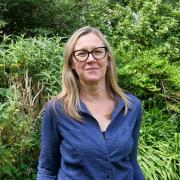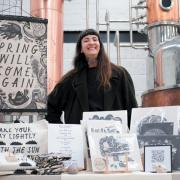Who better to tell us about Jane Austen on the 200th anniversary of her death than a writer who’s often been compared to her? Faith Eckersall caught up with our own Joanna Trollope, ahead of her talk about Austen at the Winchester Festival
If cut glass could talk it would sound like Joanna Trollope. Her accent is exquisite and her diction and use of language a joy to those of us who adore the written and spoken word.
There are other joys, too, about this writer who is so famed for chronicling middle-class lives, and one of them is her absolute generosity in forgoing the chance to plug her latest book to big-up a literary rival. Even if that rival did pass away two centuries ago.
It’s true that Trollope, who has written 20 novels under her own name and more under the name of Caroline Harvey, has been compared to Hampshire’s most feted daughter. It’s an idea she modestly brushes aside as ‘ludicrous!’ but they were both born in rectories, lived in this county (Trollope in Medstead) and, like Austen, Trollope writes in longhand. It may also be because Trollope’s particular trope – the intricate detail of middle-class female lives told with divine wit and care – echoes Austen’s rapier observation of similar folk in Georgian England.
The reason for her devotion to Austen is simple – she admires her to the point of reverence. She has re-written her novel Sense and Sensibility for a modern audience and is an ambassador for Jane’s Fund, which supports the Jane Austen’s House Museum in Chawton. “I could not believe you could actually stand in the place where Jane sat to write those books, see the views she saw and then there was the little table she wrote on,” says Trollope, of her visit there. “I almost felt like kneeling.”
She is amused by those who dismiss Austen as a romantic novelist. “That is so ignorant, because she was writing in a literary genre that had only just been invented, the novel was tremendously new,” she says, explaining that Henry Fielding’s Tom Jones, generally regarded as one of the earliest English novels, had only been written around 30 years before Austen took up her pen.
“There she was with this new genre of literature and she understood that romantic love, money and class were going to be the great preoccupation of this new genre, and she was completely right,” says Trollope.
And it’s Austen’s concerns about money and economics (it’s been argued that she had read economist Adam Smith’s ground-breaking work The Wealth of Nations) which Trollope’s Winchester Festival talk will examine.
Essentially, she says, Austen wrote about money and finance as well as personal relationships. “I want to emphasise in this talk how tough and practical Jane was because it seems to me that her novels were not just about romantic love,” she says, “They were about personal economics.” Money was always tight in the Austen household, says Trollope. “I don’t think she ever lived in a house that she or the person she was living with owned.”
She cites the letters from Austen to her sister, Cassandra, in which the price of almost everything is discussed, including ribbons. And she touches on the humiliation Jane, her mother and sister must have felt after their father’s death when their brother moved them into what Trollope describes as ‘essentially a farm cottage’ – the house in Chawton.
“The fact is that for women like Jane and her friends, life would have been perilous; you’d have to rely on a man to put a roof over your head, either by marriage or some other way,” she says. “To marry for love, like Elizabeth Bennet in Pride and Prejudice, was an absolute dream, mostly women had to live as Elizabeth’s friend, Charlotte Lucas did, marrying men to get that all-important home.”
Trollope is no fan of the traditional view of Austen as frivolous – she sees her as an independent, working woman who earned her own money in an era when such behaviour was almost unheard of.
She’s also interested in where the money belonging to Austen’s wealthier characters may have came from. She believes the fortune possessed by Mr Bingley in Pride and Prejudice came from sugar – with its dark implications of slavery – and that Pemberley, the iconic home of Mr Darcy, was: “Built on the proceeds of mineworkers, I should think. And what was the life of an 18th century mineworker?” You can almost hear her shudder.
The reason Austen was successful, however, is because she did not marry, Trollope says. “Marriage meant babies and you couldn’t control how many babies you had and so many women then died in childbirth.”
The contrast between this life and that of a modern writer couldn’t be starker, which is partly why she dismisses any comparisons between herself and Austen. “I’m good on a good day but she’s great and she is in another category,” she says, firmly. “What I think we might have in common is that both of us are saying it’s no good disregarding domestic life as a measure of your success.”
She quotes Virginia Woolf who said it was a ‘grave mistake’ to believe there is more significance in great things rather than small things. “How you live your life at home is a measure of the sort of person you are. So swanking about thinking you are going to rule the world like Alexander the Great is not actually any more successful in human terms than being Mrs Tittlemouse!”
It is typical that Trollope is willing to spend so much time praising Jane Austen and has to be prodded into talking about her own new novel, City of Friends, about four female friends who work in the City of London. “I did all the research in the City and in Canary Wharf because it’s set in the finance industry,” she says. “I found it fascinating because women don’t work the way men work – they make relationships whereas men tend to compartmentalise.”
Each character gets a chapter in turn and the book begins with one of them being made redundant – a shock that rocks the woman to her foundations and forces a secret betrayal to emerge in the lives of the friends. It may be a 21st century tale but the issue of women’s independence is pure Austen.
I tell her that I think Austen would have enjoyed her books. “It would be the most enormous compliment if she had, wouldn’t it?” she says. “She would have loved the liberalism of life now, and the way that women can work. But she’d have been streets ahead of the rest of us, and quite right too!”
Joanna Trollope is at the Festival on Thursday July 13 at the Theatre Royal, Winchester.
More…
• Celebrating Jane Austen 200 years on: 10 top events - As global attention turns to July’s 200th anniversary of the passing of Hampshire’s poster girl, Viv Micklefield finds out how Jane Austen’s beloved home county is going all out to do her proud



























